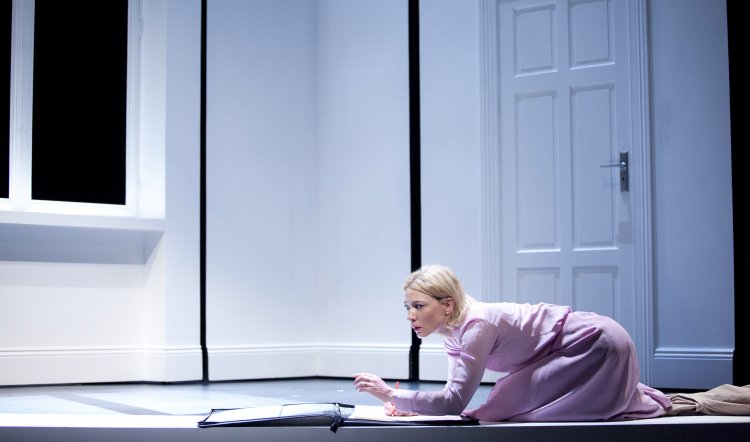
GROSS UND KLEIN (BIG AND SMALL)
GROSS UND KLEIN (BIG AND SMALL); Sydney Theatre Company @ Sydney Theatre; 19 November-23 December 2011, then touring to Europe in 2012. Photos: Lisa Tomasetti.
There were a lot of puzzled punters wandering the levels of the Sydney Theatre on opening night. The question marks were flashing like little neon squiggles in their eyes. It didn't stop a huge ovation and multiple curtain calls for Cate Blanchett and the rest of the company of 14 of our finest: it was one helluva performance. But the air buzzed with metaphorical (and whispered) "WTFs???"
Possible clues to meaning and reason? You'd not get them from the subtitle: "A journey across contemporary Germany by Botho Strauss", unless you take "contemporary" literally and think about when it was contemporary; that is: its context.
Gross und klein was written by a man born in 1944 in Naumberg, deep in what was about to become the post-war German Democratic Republic – East Germany. The small town was of slim significance, its people worked in boring little industries and a pseudo-historic cherry festival was its annual highlight. For 40 years Naumberg was dominated in every way by the USSR and a huge Soviet military base – that's how Botho Strauss grew up. It's difficult now to imagine the oppressive dreariness and relative poverty of the GDR although, in 1989 when the Wall came down, Naumberg's churches – including its incongruously magnificent cathedral – were the site of much celebration and demonstrations of joy; in a state that had officially been atheist for four decades.
On the other side of the Wall, however, everything wasn't entirely peachy in the booming, techno-efficient, industrial powerhouse of West Germany. By the time Strauss arrived and was writing and working in theatre in West Berlin – the showpiece of western Capital – the glittering obesity of the Bundesrepublik Deutschland was beginning to trouble some of its post-war generation. While Britain had its Swinging 60s (mainly in the 70s) and Mod revolt and Parisian students threw cobblestones in 1968; German student radicals were profoundly revolted by the excesses of West Germany, symbolised by Hans-Martin Schleyer.
The former SS officer and Nazi youth enthusiast had become a leading industrialist, union and worker basher. Otto Dix or Georg Grosz could have drawn his overly sensuous, openly arrogant countenance; instead he drew the attention of the Red Army Faction. He was kidnapped and the RAF demanded the release of its imprisoned members – including two of the group's founders, Andreas Baader and Gudrun Ensslin – in return for his liberty. When Baader and Ensslin æcommitted suicideæ in prison, Schleyer was killed and his body left in the boot of an Audi – a far classier boot than he deserved, let it be said.
So, what with one thing and another, the zeitgeist of both Germanys in those years was saturated with contradictions and alienation, fear and exhilaration, wild creativity and stultifying rectitude. The two Germanys were, in many ways, schizophrenic: fantasy and delusion, emotional fragmentation and breakdown abounded. Almost at the zenith of its post-war boom, the West was ever more brazen and triumphalist while the East crunched with broken socialist dreams and petty corruption. Gross und klein and its main character can be seen as the distillation of all the above.
Lotte (Blanchett) is a woman who is merrily at odds with her plight: lost and haunted in a world that has no time for her, she is having fun. She has been rejected by her husband, goes on holiday to Morocco that she can ill afford; is ignored as she listens and watches and is perpetually on the outside looking in. Even though it's obvious that "in" isn't all it's cracked up to be, she longs to be there anyway, whether it's an imagined or hoped for destination, or a possible reality that she doesn�t recognize and that doesn't recognize her.

Against the odds and the run of play, Lotte's predicament is very funny – thanks to the extraordinary performance of the extraordinary Blanchett. And the outcome is scorchingly, painfully sad as dreams and possibilities crumble; are seen to be ridiculous, unattainable or simply never there in the first place. Strauss was influenced by filmmaker Peter Handke and Lotte is in many ways a fuller and finer version of Handke's Left-Handed Woman (1978, a Cannes Festival success and audience soporific). However, where a total absence of humour in Handke's work renders his Marianne (Edith Clever) a woman who could only be a product of late 70s Germany, Strauss's Lotte is a universal and a transcender of time and place. She could be any woman on the verge of a nervous breakdown.
Gross und klein is very much a star vehicle that relies for all hope of success on that star, or more accurately, a once-in-a-generation actor (no mere star could pull it off) and Blanchett does it beautifully. Seemingly unafraid to make an ass of herself and apparently without vanity, she is funny and sad, gawky and pathetic, wicked and wondrous whether casually peeling off and discarding a false eyelash or doing an elbows-flailing dance routine of excruciating awkwardness.
She's not alone in the enterprise, however, and the play could easily be a pointless sideshow-party piece without strong and unselfish contributions from actors who are virtually cameos but essential to the adventures of little Lotte. The company travels to Europe in 2012 and its depth and strength are reassuring. Lynette Curran, Anita Hegh, Belinda McClory, Josh McConville, Robert Menzies, Katrina Milosevic, Yalin Ozucelik, Richard Piper, Richard Pyros, Sophie Ross, Chris Ryan, Christopher Stollery and Martin Vaughan are tremendous in often thankless roles (McClory does some remarkable tent acting, for instance).
Benedict Andrews orchestrates a sharply delineated series of scenes that flow one from the other despite their often inexplicable juxtapositions. The minimal set – a vast black space with occasional moments of wall, window, phone box, highway, a bed – is beautiful and, of course, alienating (design Johannes Schutz, lighting Nick Schlieper). And Alice Babidge's costumes – school-marmish matching blouse and skirt for Lotte, for instance, unobtrusive character notes for each player – are as subtle as anything she's done; the same can be said of Max Lyandvert's soundscape. The new (contemporary without strangling the original) translation/adaptation by Martin Crimp is also a major plus.
So, whatever else we send to the London Olympics, this team has every chance of making audiences sit up and take notice in the best way; and will most definitely do us proud. Yet our best hope of Olympic gold will most definitely not get a ticker tape parade on returning home. Such is life.



